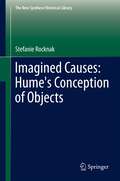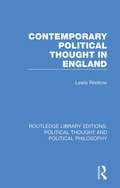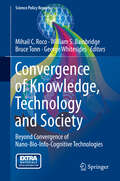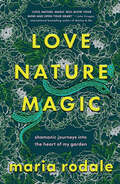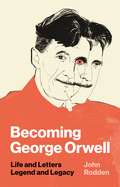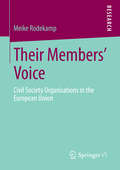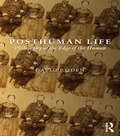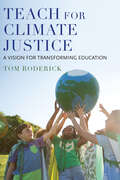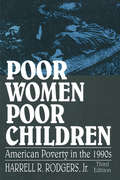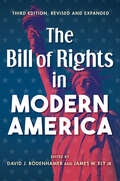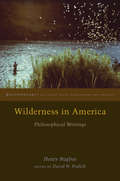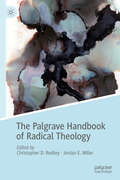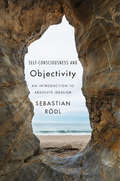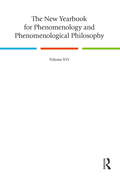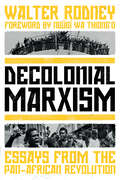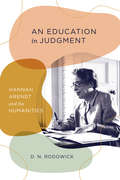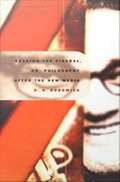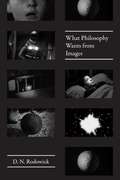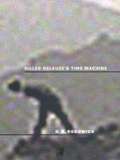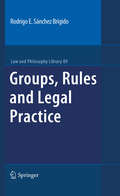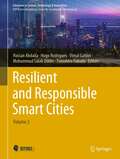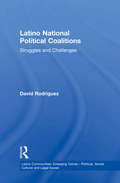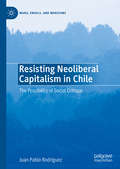- Table View
- List View
Imagined Causes: Hume's Conception of Objects
by Stefanie RocknakThis book provides the first comprehensive account of Hume's conception of objects in Book I of A Treatise of Human Nature. What, according to Hume, are objects? Ideas? Impressions? Mind-independent objects? All three? None of the above? Through a close textual analysis, Rocknak shows that Hume thought that objects are imagined ideas. But, she argues, he struggled with two accounts of how and when we imagine such ideas. On the one hand, Hume believed that we always and universally imagine that objects are the causes of our perceptions. On the other hand, he thought that we only imagine such causes when we reach a "philosophical" level of thought. This tension manifests itself in Hume's account of personal identity; a tension that, Rocknak argues, Hume acknowledges in the Appendix to the Treatise. As a result of Rocknak's detailed account of Hume's conception of objects, we are forced to accommodate new interpretations of, at least, Hume's notions of belief, personal identity, justification and causality.
Contemporary Political Thought in England (Routledge Library Editions: Political Thought and Political Philosophy #50)
by Lewis RockowFirst published in 1925. This book is a brief analysis of the historical relation of contemporary writers to their immediate predecessors. The author attempts to further a comprehensive summary of certain selected writers, with a criticism of their ideas, while in the last chapter an attempt is made at synthesis. Among those whose work is examined are Ramsay MacDonald, Bertrand Russell, Harold Laski, the Pauls, Hobhouse, Bryce, G. D. H. Cole, Norman Angell, etc. This title will be of great interest to students of politics, philosophy and history.
Convergence of Knowledge, Technology and Society: Beyond Convergence of Nano-Bio-Info-Cognitive Technologies (Science Policy Reports)
by Mihail C. Roco William S. Bainbridge Bruce Tonn George WhitesidesThis volume aims to document the most important worldwide accomplishments in converging knowledge and technology, including converging platforms, methods of convergence, societal implications, and governance in the last ten years. Convergence in knowledge, technology, and society is the accelerating, transformative interaction among seemingly distinct scientific disciplines, technologies, and communities to achieve mutual compatibility, synergism, and integration, and through this process to create added value for societal benefit. It is a movement that is recognized by scientists and thought leaders around the world as having the potential to provide far-reaching solutions to many of today's complex knowledge, technology, and human development challenges. Four essential and interdependent convergence platforms of human activity are defined in the first part of this report: nanotechnology-biotechnology-information technology and cognitive science ("NBIC") foundational tools; Earth-scale environmental systems; human-scale activities; and convergence methods for societal-scale activities. The report then presents the main implications of convergence for human physical potential, cognition and communication, productivity and societal outcomes, education and physical infrastructure, sustainability, and innovative and responsible governance. As a whole, the report presents a new model for convergence. To effectively take advantage of this potential, a proactive governance approach is suggested. The study identifies an international opportunity to develop and apply convergence for technological, economic, environmental, and societal benefits. The panel also suggests an opportunity in the United States for implementing a program aimed at focusing disparate R and D energies into a coherent activity - a "Societal Convergence Initiative". This study received input from leading academic, industry, government, and NGO experts from the United States, Latin America, Europe, Asia, and Australia.
Love, Nature, Magic: Shamanic Journeys into the Heart of My Garden
by Maria RodaleJoin bestselling author, activist, and garden expert Maria Rodale on her shamanic journeys as she reflects on her surprising conversations with the spirits of the familiar plants and animals around us—and the knowledge they share with us. In Love, Nature, Magic, organic advocate and former CEO of a global health and wellness company Maria Rodale combines her love of nature and gardening with her experience in shamanic journeying, embarking on an epic adventure to learn from plants, animals, and insects—including some of the most misunderstood beings in nature. Maria asks them their purpose and listens as they show and declare what they want us humans to know. From Thistles to Snakes, Poison Ivy to Mosquitoes, these nature beings convey messages that are relevant to every human, showing us how to live in balance and harmony on this Earth. Through journeys filled with surprises, humor, and foibles, follow Maria’s evolution from being annoyed with to accepting—and even falling in love with—our most difficult neighbors (including human ones). Along the way, she tells her own story of how she learned about shamanic journeying and its near-universal manifestation in traditional cultures worldwide. She describes what her experiences of shamanic journeying are like—simply, honestly, and with a touch of irreverence. Maria’s journeys include conversations with: Mugwort • Vulture • Bat • Rabbit • Lanternfly • Lightning Bug • Osage Orange • Deer • Paper Wasp • Dandelion • Tick • Groundhog • Milkweed • And more! Throughout, Rodale shares an essential truth that resonates across her shamanic explorations: We first must heal our own hearts, for only then can we truly love others and begin to heal planet Earth.
Becoming George Orwell: Life and Letters, Legend and Legacy
by John RoddenThe remarkable transformation of Orwell from journeyman writer to towering iconIs George Orwell the most influential writer who ever lived? Yes, according to John Rodden’s provocative book about the transformation of a man into a myth. Rodden does not argue that Orwell was the most distinguished man of letters of the last century, nor even the leading novelist of his generation, let alone the greatest imaginative writer of English prose fiction. Yet his influence since his death at midcentury is incomparable. No other writer has aroused so much controversy or contributed so many incessantly quoted words and phrases to our cultural lexicon, from “Big Brother” and “doublethink” to “thoughtcrime” and “Newspeak.” Becoming George Orwell is a pathbreaking tour de force that charts the astonishing passage of a litterateur into a legend.Rodden presents the author of Animal Farm and Nineteen Eighty-Four in a new light, exploring how the man and writer Orwell, born Eric Arthur Blair, came to be overshadowed by the spectral figure associated with nightmare visions of our possible futures. Rodden opens with a discussion of the life and letters, chronicling Orwell’s eccentricities and emotional struggles, followed by an assessment of his chief literary achievements. The second half of the book examines the legend and legacy of Orwell, whom Rodden calls “England’s Prose Laureate,” looking at everything from cyberwarfare to “fake news.” The closing chapters address both Orwell’s enduring relevance to burning contemporary issues and the multiple ironies of his popular reputation, showing how he and his work have become confused with the very dreads and diseases that he fought against throughout his life.
Their Members' Voice
by Meike RodekampThe role of civil society organisations in Brussels is debated. Some view them as representatives of their members and thus as legitimising agents for policy-making in the European Union. Others see them as being elitist and out of touch with their membership bases, therefore ill-suited to promote democracy at the EU level. Taking civil society organisations in the EU's external relations as an example, Meike Rodekamp submits these controversial views to a reality check. Interviews with representatives of civil society organisations in Brussels and their member organisations in the EU show that the Brussels offices have not lost contact with their members. However, member organisations differ substantially in their participation in internal decision-making processes, which raises doubts about the legitimacy gains through civil society participation in EU policy-making.
Posthuman Life: Philosophy at the Edge of the Human
by David RodenWe imagine posthumans as humans made superhumanly intelligent or resilient by future advances in nanotechnology, biotechnology, information technology and cognitive science. Many argue that these enhanced people might live better lives; others fear that tinkering with our nature will undermine our sense of our own humanity. Whoever is right, it is assumed that our technological successor will be an upgraded or degraded version of us: Human 2.0.Posthuman Life argues that the enhancement debate projects a human face onto an empty screen. We do not know what will happen and, not being posthuman, cannot anticipate how posthumans will assess the world. If a posthuman future will not necessarily be informed by our kind of subjectivity or morality the limits of our current knowledge must inform any ethical or political assessment of that future. Posthuman Life develops a critical metaphysics of posthuman succession and argues that only a truly speculative posthumanism can support an ethics that meets the challenge of the transformative potential of technology.
Teach for Climate Justice: A Vision for Transforming Education
by Tom RoderickA proactive, inclusive plan for the cross-disciplinary teaching of climate change from preschool to high school. In Teach for Climate Justice, accomplished educator and social and emotional learning expert Tom Roderick proposes a visionary interdisciplinary and intersectional approach to PreK–12 climate education. He argues that meaningful instruction on this urgent issue of our time must focus on climate justice—the convergence of climate change and social justice—in a way that is emotionally safe, developmentally appropriate, and ultimately empowering. Drawing on examples of real-life educators teaching climate change, Roderick identifies eight key dimensions of climate education that will prepare students to face the challenges of the climate crisis and give them the means to take action. These dimensions include not only educating for a deep understanding of the scientific, geopolitical, and socioeconomic equity issues that surround global warming, but also cultivating appreciation for the environment, building a supportive community, and fostering active hope for the future. Roderick's intentional layering of skills will help students develop the knowledge and sense of agency necessary to engage in civil resistance and nonviolent activism. In support of this crucial endeavor, Roderick suggests evidence-based teaching strategies, practices that promote inclusivity, and tools for social and emotional learning. This timely and uplifting book lays out a powerful vision for teaching, learning, and curriculum development to nurture a generation of courageous, informed advocates for climate justice.
Poor Women, Poor Children: American Poverty in the 1990s
by RodgersThis work presents the most recent data on poverty, family structure and participation in welfare programmes. It analyses the causes for the continuing rise in female-headed households, the high rates of poverty among such families, and evaluates past, present and future reform policies.
The Bill of Rights in Modern America: Third Edition, Revised and Expanded
by Daniel T. Rodgers Suzanna Sherry Melvin I. Urofsky Robert J. Cottrol Raymond T. Diamond Paul Moreno Laurence A. Benner Michal R. Belknap Adam D. Moore Kunal M. Parker Marie-Amélie George Randall T. ShepardAs the 2020s began, protestors filled the streets, politicians clashed over how to respond to a global pandemic, and new scrutiny was placed on what rights US citizens should be afforded. Newly revised and expanded to address immigration, gay rights, privacy rights, affirmative action, and more, The Bill of Rights in Modern America provides clear insights into the issues currently shaping the United States. Essays explore the law and history behind contentious debates over such topics as gun rights, limits on the powers of law enforcement, the death penalty, abortion, and states' rights. Accessible and easy to read, the discerning research offered in The Bill of Rights in Modern America will help inform critical discussions for years to come.
Wilderness in America: Philosophical Writings (Groundworks: Ecological Issues in Philosophy and Theology)
by David W. Rodick Henry BugbeeThe philosophy of Henry Bugbee defies traditional academic categorization. Though inspired by Heidegger and American Transcendentalism, he was also admired by the famous analytic philosopher Willard van Orman Quine, who described him as the ultimate exemplar of the examined life. Bugbee’s writings are remarkably different from anything written in twentieth-century American philosophy, most famously in the journal-form of his best-known work, The Inward Morning. The beautifully written essays collected here show Bugbee’s continuing commitment that “anyone who throws his entire personality into his work must to some extent adopt an aesthetic attitude and medium.” Beginning with an introductory account of Bugbee’s “experiential naturalism,” this book brings Bugbee’s early writings together with some of his most celebrated essays, as well as unpublished pieces, an extended interview, and a handful of tributes and reflections by others. Together, the book reintroduces a major thinker of nature, an environmental philosopher avant la lettre who has much to contribute to American and continental thought.
The Palgrave Handbook of Radical Theology (Radical Theologies and Philosophies)
by Christopher D. Rodkey Jordan E. MillerThe Palgrave Handbook of Radical Theology is the definitive guide to radical theology and the commencement for new directions in that field. For the first time, radical theology is addressed and assessed in a single, comprehensive volume, including introductory and historical essays for the beginner, essays on major figures and their thought, and shorter articles on various themes, concepts, and related topics. This book is a seminal work for the radical theology movement. It clarifies origins and demonstrates the exigency and utility of current figures and issues. A useful and essential guide for newcomers and veterans in the field, this volume serves as both a reference work and an introduction to omitted or forgotten topics within contemporary discussions.
Self-Consciousness and Objectivity: An Introduction to Absolute Idealism
by Sebastian RödlSebastian Rödl undermines a foundational dogma of contemporary philosophy: that knowledge, in order to be objective, must be knowledge of something that is as it is, independent of being known to be so. This profound work revives the thought that knowledge, precisely on account of being objective, is self-knowledge: knowledge knowing itself.
The New Yearbook for Phenomenology and Phenomenological Philosophy: Volume 16
by Rodney K.B. Parker Ignacio QueponsVolume XVI Phenomenology of Emotions, Systematical and Historical Perspectives Aim and Scope: The New Yearbook for Phenomenology and Phenomenological Philosophy provides an annual international forum for phenomenological research in the spirit of Husserl's groundbreaking work and the extension of this work by such figures as Scheler, Heidegger, Sartre, Levinas, Merleau-Ponty and Gadamer. Contributors: Esteban Marín Ávila, Thiemo Breyer, Jakub Čapek, Mariano Crespo, Roberta De Monticelli, John J. Drummond, Søren Engelsen, Maria Gyemant, Mirja Hartimo, Elisa Magrì, Ronny Miron, Anthony J. Steinbock, Panos Theodorou, Íngrid Vendrell Ferran, Antonio Zirión Quijano, and Nate Zuckerman. Submissions: Manuscripts, prepared for blind review, should be submitted to the Editors (burt-crowell.hopkins@univ-lille3.fr and drummond@fordham.edu) electronically via e-mail attachments.
Decolonial Marxism: Essays from the Pan-African Revolution
by Walter RodneyA previously unpublished collection of Rodney's essays on Marxism, spanning his engagement with of Black Power, Ujamaa Villages, and the everyday people who put an end to a colonial eraEarly in life, Walter Rodney became a major revolutionary figure in a dizzying range of locales that traversed the breadth of the Black diaspora: in North America and Europe, in the Caribbean and on the African continent. He was not only a witness of a Pan-African and socialist internationalism; in his efforts to build mass organizations, catalyze rebellious ferment, and theorize an anti-colonial path to self-emancipation, he can be counted among its prime authors.Decolonial Marxism records such a life by collecting previously unbound essays written during the world-turning days of Black revolution. In drawing together pages where he elaborates on the nexus of race and class, offers his reflections on radical pedagogy, outlines programs for newly independent nation-states, considers the challenges of anti-colonial historiography, and produces balance sheets for a dozen wars for national liberation, this volume captures something of the range and power of Rodney's output. But it also demonstrates the unbending consistency that unites his life and work: the ongoing reinvention of living conception of Marxism, and a respect for the still untapped potential of mass self-rule.
An Education in Judgment: Hannah Arendt and the Humanities
by D. N. RodowickIn An Education in Judgment, philosopher D. N. Rodowick makes the definitive case for a philosophical humanistic education aimed at the cultivation of a life guided by both self-reflection and interpersonal exchange. Such a life is an education in judgment, the moral capacity to draw conclusions alone and with others, and in letting one’s own judgments be answerable to the potentially contrasting judgments of others. Thinking, for Rodowick, is an art we practice with and learn from each other on a daily basis. In taking this approach, Rodowick follows the lead of Hannah Arendt, who made judgment the cornerstone of her conception of community. What is important for Rodowick, as for Arendt, is the cultivation of “free relations,” in which we allow our judgments to be affected and transformed by those of others, creating “an ever-widening fabric of intersubjective moral consideration.” That is a fragile fabric, certainly, but one that Rodowick argues is worth pursuing, caring for, and preserving. This original work thinks with and beyond Arendt about the importance of the humanities and what “the humanities” amounts to beyond the walls of the university.
An Education in Judgment: Hannah Arendt and the Humanities
by D. N. RodowickIn An Education in Judgment, philosopher D. N. Rodowick makes the definitive case for a philosophical humanistic education aimed at the cultivation of a life guided by both self-reflection and interpersonal exchange. Such a life is an education in judgment, the moral capacity to draw conclusions alone and with others, and in letting one’s own judgments be answerable to the potentially contrasting judgments of others. Thinking, for Rodowick, is an art we practice with and learn from each other on a daily basis. In taking this approach, Rodowick follows the lead of Hannah Arendt, who made judgment the cornerstone of her conception of community. What is important for Rodowick, as for Arendt, is the cultivation of “free relations,” in which we allow our judgments to be affected and transformed by those of others, creating “an ever-widening fabric of intersubjective moral consideration.” That is a fragile fabric, certainly, but one that Rodowick argues is worth pursuing, caring for, and preserving. This original work thinks with and beyond Arendt about the importance of the humanities and what “the humanities” amounts to beyond the walls of the university.
Philosophy's Artful Conversation
by D. N. RodowickTheory--an embattled discourse for decades--faces a new challenge from those who want to model the methods of all scholarly disciplines on the sciences. What is urgently needed, says D. N. Rodowick, is a revitalized concept of theory that can assess the limits of scientific explanation and defend the unique character of humanistic understanding.
Reading the Figural: Or, Philosophy After the New Media
by D. N. RodowickIn Reading the Figural, or, Philosophy after the New Media D. N. Rodowick applies the concept of "the figural" to a variety of philosophical and aesthetic issues. Inspired by the aesthetic philosophy of Jean-Franois Lyotard, the figural defines a semiotic regime where the distinction between linguistic and plastic representation breaks down. This opposition, which has been the philosophical foundation of aesthetics since the eighteenth century, has been explicitly challenged by the new electronic, televisual, and digital media. Rodowick--one of the foremost film theorists writing today--contemplates this challenge, describing and critiquing the new regime of signs and new ways of thinking that such media have inaugurated. To fully comprehend the emergence of the figural requires a genealogical critique of the aesthetic, Rodowick claims. Seeking allies in this effort to deconstruct the opposition of word and image and to create new concepts for comprehending the figural, he journeys through a range of philosophical writings: Thierry Kuntzel and Marie-Claire Ropars-Wuilleumier on film theory; Jacques Derrida on the deconstruction of the aesthetic; Siegfried Kracauer and Walter Benjamin on the historical image as a utopian force in photography and film; and Gilles Deleuze and Michel Foucault on the emergence of the figural as both a semiotic regime and a new stratagem of power coincident with the appearance of digital phenomena and of societies of control. Scholars of philosophy, film theory, cultural criticism, new media, and art history will be interested in the original and sophisticated insights found in this book.
What Philosophy Wants from Images
by D. N. RodowickIn recent decades, contemporary art has displayed an ever increasing and complicated fascination with the cinema—or, perhaps more accurately, as D. N. Rodowick shows, a certain memory of cinema. Contemporary works of film, video, and moving image installation mine a vast and virtual archive of cultural experience through elliptical and discontinuous fragments of remembered images, even as the lived experience of film and photography recedes into the past, supplanted by the digital. Rodowick here explores work by artists such as Ken Jacobs, Ernie Gehr, Victor Burgin, Harun Farocki, and others—artists who are creating forms that express a new historical consciousness of images. These forms acknowledge a complex relationship to the disappearing past even as they point toward new media that will challenge viewers’ confidence in what the images they see are or are becoming. What philosophy wants from images, Rodowick shows, is to renew itself conceptually through deep engagement with new forms of aesthetic experience.
Gilles Deleuze’s Time Machine
by David RodowickAlthough Gilles Deleuze is one of France's most celebrated twentieth-century philosophers, his theories of cinema have largely been ignored by American scholars. Film theorist D. N. Rodowick fills this gap by presenting the first comprehensive study, in any language, of Deleuze's work on film and images. Placing Deleuze's two books on cinema--The Movement-Image and The Time-Image--in the context of French cultural theory of the 1960s and 1970s, Rodowick examines the logic of Deleuze's theories and the relationship of these theories to his influential philosophy of difference.Rodowick illuminates the connections between Deleuze's writings on visual and scientific texts and describes the formal logic of his theory of images and signs. Revealing how Deleuzian views on film speak to the broader network of philosophical problems addressed in Deleuze's other books--including his influential work with Félix Guattari--Rodowick shows not only how Deleuze modifies the dominant traditions of film theory, but also how the study of cinema is central to the project of modern philosophy.
Groups, Rules and Legal Practice
by Rodrigo Eduardo Sánchez BrigidoEver since Hart´s The Concept of Law, legal philosophers agree that the practice of law-applying officials is a fundamental aspect of law. Yet there is a huge disagreement on the nature of this practice. Is it a conventional practice? Is it like the practice that takes place, more generally, when there is a social rule in a group? Does it share the nature of collective intentional action? The book explores the main responses to these questions, and claims that they fail on two main counts: current theories do not explain officials´ beliefs that they are under a duty qua members of an institution, and they do not explain officials´ disagreement about the content of these institutional duties. Based on a particular theory of collective action, the author elaborates then an account of certain institutions, and claims that the practice is an institutional practice of sorts. This would explain officials´ beliefs in institutional duties, and officials´ disagreement about those duties. The book should be of interest to legal philosophers, but also to those concerned with group and social action theories and, more generally, with the nature of institutions.
Resilient and Responsible Smart Cities: Volume 2 (Advances in Science, Technology & Innovation)
by Hugo Rodrigues Hassan Abdalla Tomohiro Fukuda Vimal Gahlot Mohammad Salah UddinThis book aims to establish a community with attention to land use to achieve sustainable development and meet the needs of today’s society. Urban planning depends on engineering, architectural, social and political pillars. It pursues this by proposing solutions, regulating environmental pollution and non-sustainable use of available resources. It showcases and even triggers further debate about connections between sustainable development, urban planning and technology in hopes of achieving sustainable development models that sustain urban expansion and shape cities that improve the overall quality of life. It views urban planning and development as vital fields that ensure the application of revolutionary approaches with new materials and processes incorporated in the most efficient manner.
Latino National Political Coalitions: Struggles and Challenges (Latino Communities: Emerging Voices - Political, Social, Cultural and Legal Issues)
by David RodriguezThis study examines Latino national political coalitions in the United States with a focus on Chicanos, Puerto Ricans, and Cubans. It argues that Latino national political coalitions are an avenue of political empowerment for the Latino Community, but face social, economic, and political challenges in the Latino community.
Resisting Neoliberal Capitalism in Chile: The Possibility of Social Critique (Marx, Engels, and Marxisms)
by Juan Pablo RodríguezThis book explores the relationship between recent theoretical debates around the fate of critique of neoliberal capitalism and critical theory, on the one hand, and the critical theories generated in and by social movements in Chile, on the other. By taking the idea of social critique as a field that encompasses both critical social theories and the practices of social criticism carried out by social movements, Resisting Neoliberal Capitalism in Chile explores how the student and the Pobladores movements map, resist and contest neoliberal capitalism in commodified areas such as education and housing in Chile, one of the first ‘neoliberal experiments’ in Latin America and the world.
